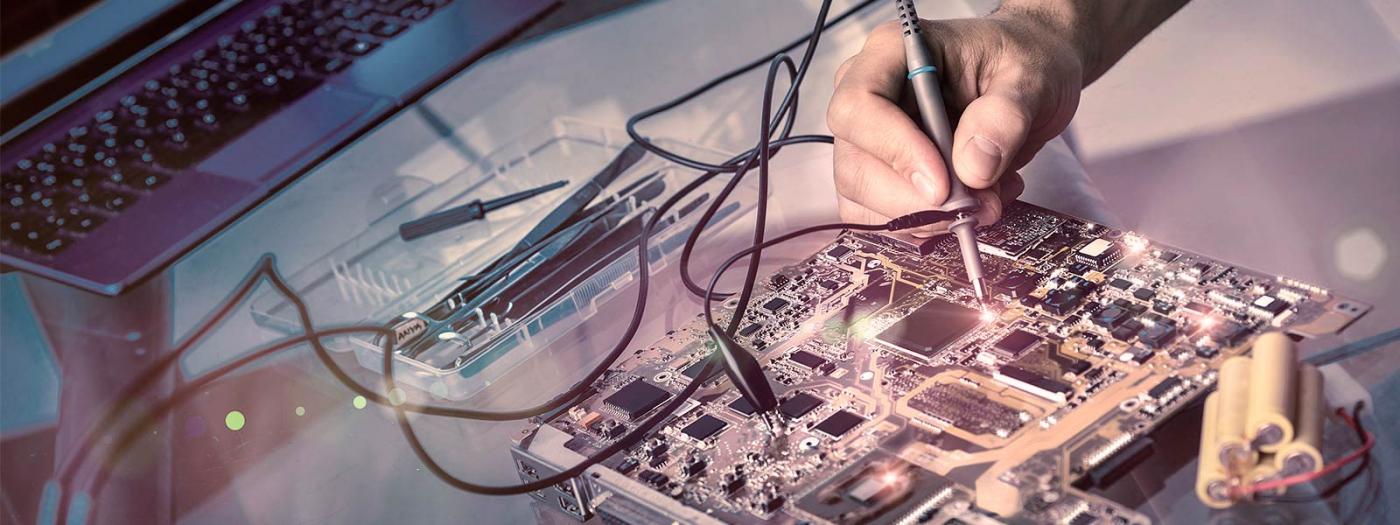This course aims to introduce the student to the basic control theory for dynamic systems.
In the first part of the course the basic principles of automatic control and the different representation of dynamic systems will be studied. In the second part, stability of dynamic systems will be studied. The third part of the course will consist on the design of controllers based on the transfer function of the system. In the last part of the course, a brief introduction to state-space control will be given.
Titular Professors
Circuit Theory and Feedback
Learning Outcomes of this subject are:
1 Basic knowledge in control and modelling of dynamic systems by means of differential equations.
2 Transformation of linear differential equations to block diagrams, to transfer function and state-space models.
3 Time response analysis of dynamic systems and system identification based on time response.
4 Stability study of dynamic systems.
5 Design of controllers in the frequency domain based on specifications.
6 Evaluation of the performance of the designed controller based on the time response.
Part I. Basic control concepts and representation of dynamic systems
1. Introduction to control systems
1.1 Definitions: Plant, controller, output variable, control variable, disturbances
1.2 Open-loop and closed-loop systems
2. Dynamic systems
2.1 Types of dynamic systems
2.1.1 Time-variant and time-invariant systems
2.1.2 Linear and non-linear systems
2.1.3 Linearization of non-linear systems
2.2 Mathematical model of electrical and mechanical systems
2.3 Representation in the frequency domain
2.3.1 Transfer functions
2.3.2 Poles and zeros of a system
2.3.3 Canonic form and canonic gain
2.4 Block diagram representation
2.5 Systems with multiple inputs and outputs
2.6 Representation in state-space
Part II. Time response and stability study
3. Time response characterization of a dynamic system
3.1 Introduction
3.2 Elementary input signals
3.3 First order systems
3.4 Second order systems
3.5 Higher order systems
4. Stability analysis
4.1 Introduction
4.2 Stability by means of pole localization in the complex plane
4.3 Routh-Hurwitz criterion
4.4 Steady-state error and system type
Part III. Controller design in the frequency domain
5. Analysis and design of control systems
5. Analysis and design of control systems
5.1 Proportional, Integral and Derivative control actions
5.1.1 Proportional controller
5.1.2 Proportional-Integral controller
5.1.3 Proportional-Integral-Derivative (PID)
5.2 Analysis and design of controllers based on root locus
5.2.1 Root locus
5.2.2 Controller design based on root locus
5.3 PID tuning by means of Ziegler-Nichols method
Part IV. Introduction to state-space
6. State-space
6.1 Definitions and state representation
6.2 Transfer functions to state-space
6.3 State-space to transfer functions
6.4 Poles, zeros and system order in state-space
The course will be based on theoretical classes that will be accompanied by examples and exercises. Moreover, practical lessons will be held using Matlab.
The subject will be evaluated through:
- Exercises proposed and carried out in class weekly.
- Practices
- Exams
The final grade will be computed as follows:
Course_grade =
10% · CE_Grade +
20% · Practices_Grade +
70% ·Exams_Grade
AC_Grade: weekly exercises proposed and done in class.
Practices_Grade: Practice reports, complemented by in-class evaluation.
Exams_Grade: Exams done during the semester: the checkpoint exam and the final exam. To pass the course, minimum grade of 4.0 is required in Exams_Grade, it will be computed as follows:
Exams_Grade = Max (33.33% · Checkpoint_Grade + 66.67% · FinalExam_Grade, 100% · FinalExam_Grade)
Ogata, Katsuhiko, Control Modern engineering
Ricard Villà (2018). Dinàmica de sistemes. Free access.
https://sites.google.com/site/ricardvilla/apunts-dinamica-de-sistemes
D'Azzo-Houpis, Control Linear systems
Ogata, Katsuhiko, Discrete-Time Control Systems, Prentice-Hall
P. De Larminat, Automatique des sistemes lineaires, Flammarion Sciencies
G. Rao, Complex digital control systems, Van Nostrand-Reinhold
J. Corominas, Introduction to the computer process control, Marcombo
J.M. Angulo, Course of robotics, Paraninfo
R. Dorf, Automatic control systems. Theory and practice, Fondo Educativo Interamericano
L. Pontryaguine, Theorie mathematique des processus optimaux, Mir
M. El-Hawary, Control System Engineering, Reston
Olle I. Elgerd, Control Systems Theory, Mc. Graw-Hill
Y. Faes, Commande des Processus Industriels par calculateur, Masson
V. Hernando Gutierrez, PLCs and his application to the industrial computer science, Comisión Cursos AEIT/COIT
S.M. Shinners, Modern Control Systems. Theory and Application, Addisson-Wesley Charles L. Phillips / H. Troy Nagle, Sistemas de Control Digital. Análisis y Diseño, Gustavo Gili
